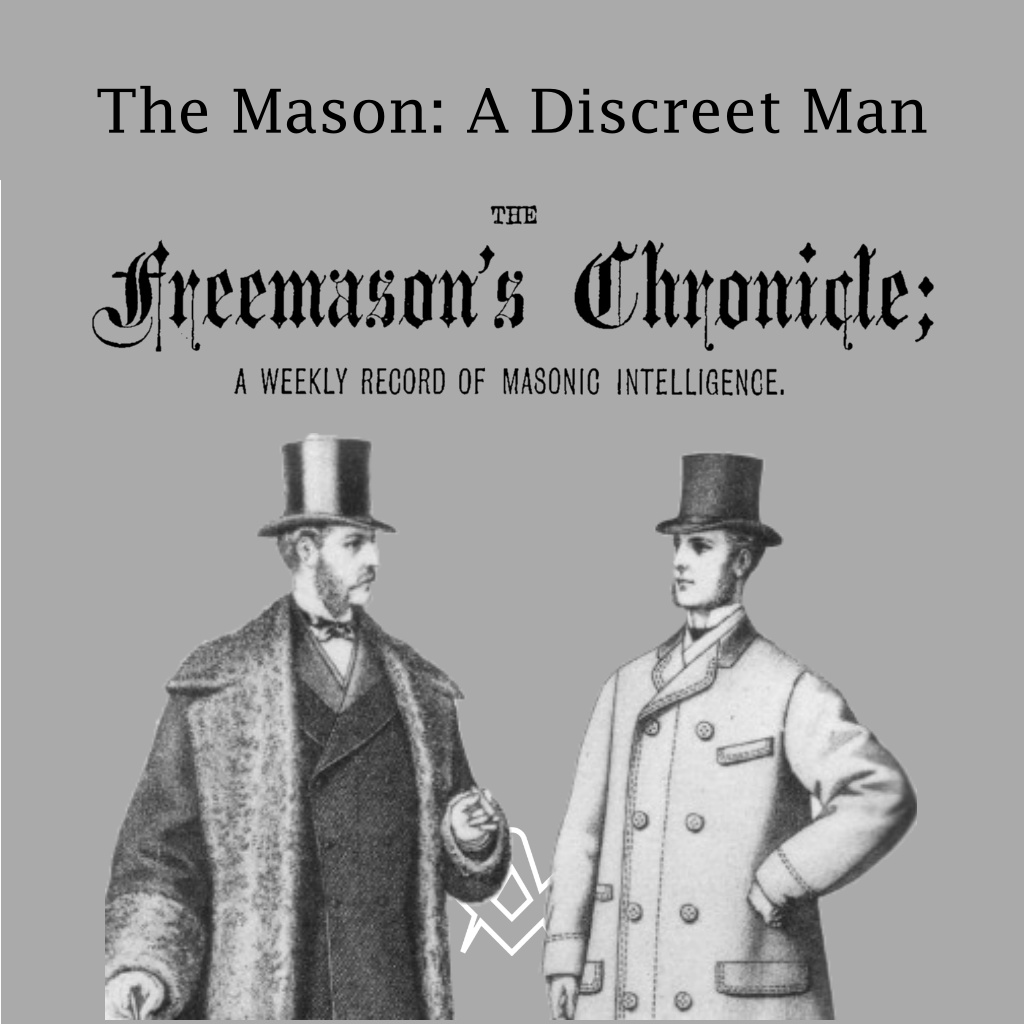In former articles we have endeavoured to show that a good Mason should be a gentleman, and a sincere man.
It is not our intention to claim for him the possession of all the cardinal virtues.
An overdrawn picture invariably has something grotesque in its appearance, which makes it laughable in the sight of men, and involves that of which it is meant to be the portrait in endless ridicule.
We shall not, however, ore in excess of colouring if we assign to him the not unimportant attribute of discretion.
Scarcely a day passes but every member of the Craft must find himself called upon to exercise this virtue, and the higher his rank, the greater the estimation in which he is held by his brethren, the more imperative is it that he should be discreet.
We may even go so far as to affirm, that though a Mason may be a gentleman and a sincere man—though he possess all the excellences which may reasonably be claimed for him—yet will he prove a poor exemplar for others to follow if he lack discretion.
We will not inflict on our readers a lengthy dissertation on the qualities of discretion, nor a dry analysis of the properties it possesses.
It is not, perhaps, a very popular virtue; at least, it is not a very showy one, and does not excite a very great amount of enthusiasm.
Thus, a few people may admire the discretion which Falstaff described as ” the better part of valour,” but the many deride it, and think it differs, in a slight degree only, from cowardice.
Yet in no career is discretion more needed than in the military. To take a few cases that occur to us at the moment.

Patrice de Mac-Mahon, maréchal de France (1808-1893)
IMAGE LINKED: wikimedia Attribution 4.0 International (CC BY 4.0)
MacMahon at Woerth (battle of ) doggedly contesting every inch of ground, till sheer weight of numbers drove him from the field, is a picture that excites our admiration; but MacMahon warily retreating before superior forces, to the passes of the Vosges, ‘reculer pour mieux sauter ‘ (French: ‘to draw back in order to leap better’) would have been still more admirable from a military point of view.
Who knows, had he done so, but the tide of battle might have rolled towards Berlin, instead of, as it happened, towards Paris, and Napoleon III. died in the purple at the Tuileries instead of in exile at Chislehurst?
Again, the charge of the Six Hundred at Balaclava always stirs the blood of Englishmen, yet, as was remarked at the time, ‘C’est magnifique, mais ce n’est pas la guerre’ (French; ‘it is magnificent, but it is not war’)
Our own Wellington was among the most discreet of modern generals. He could be bold even to audacity, as at the passage of the Douro, at Ciudad Rodrigo, at Badajoz (Storming of Badajoz) or discreet and wary, as in the retreat on Torres Vedras.
On one occasion, we believe, with only a slender force of 15,000 men, he confronted the whole army of Marmont, not courting, yet not seeming to decline, the combat.

Auguste de Marmont as a General of the French Revolutionary Army
IMAGE LINKED: wikimedia Attribution 4.0 International (CC BY 4.0)
In boldness lay discretion, and Marmont never knew till it was too late how narrowly he had missed the chance of crushing- his formidable adversary.
The fame of one old Roman general rests almost entirely on his discretion—we mean Fabius surnamed Cunctator, of whom Ennius sang :
“Unus homo nobis cunctando restituit rem “
Unus homo nobis cunctando restituit rem.
Noenum rumores ponebat ante salutem;
Ergo plusque magisque viri nunc gloria claret.(One man, by delaying, restored the state to us.
He valued safety more than mob’s applause;
Hence now his glory more resplendent grows.)
Quote: Fabius Maximus
Again, the driver of the express train who, seeing an obstacle on the line a short distance ahead of him, crashed through it at full speed—he, undoubtedly, was a discreet man, and bold withal.
The safety of the charge entrusted to his skill lay in a fearful speed, and he applied it.
There was no hesitation, for there was no time to hesitate. The danger and the escape were almost simultaneous. These are a few of the instances that might be adduced in order to prove the value of discretion in times or cases of difficulty and danger.
Happily Masons are a peaceful, not a militant body.
Such examples may serve as a guide to the individual brother who follows the profession of arms, or the more peaceful but hardly less dangerous career of a civil engineer.
The majority are men of peace, and the teachings of Masonry are essentially peaceful.
What, then, is discretion from a Masonic point of view ?
The modest answer will raise a laugh perhaps, many even exclaiming,
Parturiunt montes, nascetur rhliculus mus (the mountains are in labour, (and) an absurd mouse will be born.)
– one of Aesop’s Fables
We have nothing better to offer in the way of definition than this: Discretion is the faculty of always doing or saying the right thing at the right time in the right place.
Very simple, yet very necessary and somewhat trying. Be it remembered that it is not always the grand occasions, when a man’s nerves are probably well-strung, and his mind well prepared for what may happen, that try a man.
It is not the occasional spurt which tests an athlete, but his powers of endurance and his skill in making his effort at the right moment.
Now a Mason’s faculty of discerning is always, so to speak, on trial. He is, as it were, a sentinel, always on guard over the obligations reposed in him.
He must be always discreet, so as never, by word or sign, to betray the mysteries of his Order.
In all his acts and deeds he should command the respect, not only of his brethren but of the outside world.
For as a man, so will Masonry, which is an aggregate of men, be judged by its conduct, not by its professions.
The proposal of new candidates for admission into the Order, without due inquiry whether they are worthy and respectable men, is a grave act of indiscretion, which a too confiding, too good-natured Brother should especially guard against.
Again, the Fraternity prides itself, with good cause, on its charity, but indiscriminate charity is hurtful.
To give without knowing whom you give to, and whether he is worthy to receive, is an abuse of charity. But still more incumbent is it on office holders to govern themselves discreetly.
A Worshipful Master may be learned, just and good, but he must also be discreet, or his Lodge will be chaos.
The visitor must be tried and proven, not formally, and merely because it is “in the bond,” but fully and truly, to the end that no uninitiate person gain entrance to a Lodge.
All officers, in short, should be studious of their duties, or Masonry must suffer.
Nor, again, should men seek office who are unequal to or unfitted for its responsibilities. An ill-educated, unrefined officer, however estimable in his character, were a reproach to the Brotherhood.
But not to weary our readers further on this subject, we cannot do better, perhaps, than conclude our article with a short extract from a work by an eminent Mason, a work to which we have already found and may again find it expedient to refer to — Dr. Oliver’s Revelations of a Square.
It bears directly on the matter of discretion, and especially on one of the points we have referred to, the too careless admission of visitors into a Lodge.
We give it in outline, but in the words oi the narrator, for no story, however carefully translated, reads half so well as in its original form.” We had once a rich scene in our Lodge, during Bro. Dunckerley’s mastership, which carries with it a useful lesson, and ought not to be disregarded,” proceeded my gossiping companion. … “

Thomas Dunckerley (1724 – 1795) was a prominent freemason, being appointed Provincial Grand Master of several provinces, promoting Royal Arch masonry, introducing Mark Masonry to England, and instituting a national body for Templar masonry.
IMAGE LINKED: wikimedia Attribution 4.0 International (CC BY 4.0)
A stranger presented himself as a visitor, was examined and admitted. He proved to be of a respectable standing in society, although on the present occasion he lent himself to the perpetration of a very disreputable affair, and the Right Worshipful Master, with all his tact and discrimination, was very nearly outwitted.
An ancient law of Masonry provided that no visitor, however skilled in the art, shall be admitted into a Lodge unless he is personally known to, or well vouched and recommended, by some of the brethren then present.
Many occasions arose in which it had been deemed expedient to remit the strict observance of the rule, and such had been the case in the present instance.
The intruder, however, had not occupied his precarious position more than five minutes, before a venerable brother called aloud, ‘ IT RAINS !’
Bro. Dunckerley’s presence of mind did not forsake him in this emergency, and he gravely demanded of the visitor,’ Where were you made a Mason ?’
The answer was at hand. ‘ In a Lodge, at the King’s Head, Gravesend.’
This reply betrayed him. The brethren rose simultaneously from their seats, in some degree of unnecessary – ;alarm, like a flock of sheep in the presence of a strange dog.
Indeed, if the Wandering Jew had appeared among them in ‘prima persona’ they would scarcely have exhibited a more urgent demand for his summary expulsion than was implied in the loud and universal murmurs of dis approbation which were heard from every part of the Lodge.
The intruder was perplexed ; he saw his error, but knew not the remedy: and when the R.W.M. quietly observed :
‘ Now, sir, will you be kind enough to favour us with your version of the story,’
he replied in the language of Canning’s Knife Grinder:
‘ Story !—God bless you !—I have none to tell!
I was anxious to see a Lodge of Brethren at work, and one of your seceding members furnished me with answers to a few questions, which he said would be proposed in the Tyler’s room, and for a frolic I was determined to test the truth, as, at the very worst, I could only be ejected, which I did not conceive would be either a disappointment or a disgrace; for, to say the truth, I scarcely expected to gain admittance into the Lodge.’
”What was to be done? The dilemma was pressing . . . .the delinquent was securely locked up in the preparing, room . . . The confusion . . . may carry some idea of the consternation which ensued.
All spoke together, and the reins of authority seemed to have been unnaturally snapped asunder; for the R.W.M. had retired with his Wardens behind the pedestal . . .
One or two young members . . . jumped upon the benches . . .vociferating, ‘ Out with him ! Down with the intruder! Turn him out!’
Others were more moderate . . .And others. . . . were clamorous that the watch (Police) should be called in, and the intruder transferred to the roundhouse.”
Meanwhile, Bro. Dunckerley had matured his plan, and having ascended into the chair …. said;
‘ Brethren I need not tell you that we are placed at this moment in a situation where a false step may involve not only this Lodge, but the entire Craft, in unknown difficulties.
It was the maxim of Socrates,—it is well to punish an enemy, but it is better to make him your friend.
Now we must not content ourselves with asking who examined him, or why he was admitted, for he is actually amongst us, and it is too late to prevent the intrusion.
And if we wore to adopt the worthy Brother’s advice, who recommended him to be turned out, the matter would not be greatly mended the principal difficulty would still remain.
I conceive, therefore, that the wisest course we can pursue under those circumstances will be, to use our best endeavours towards converting this temporary evil into a permanent benefit, as the bee extracts honey from the most poisonous flowers, by transforming the unwelcome cowan into a worthy Mason.
For this purpose, I propose that, if his station of life be not objectionable, the provision of our bye-laws respecting the admission of candidates be suspended in this single instance, and that he be initiated on the spot.’
The proposition was regularly seconded by the S.W., and was unanimously agreed to, and the intruder was again introduced by the senior E.A.P.
The R.W. then first examined him, as to his residence, trade, and respectability of character; and these inquiries being satisfactorily disposed of, the question was proposed whether he would adopt the alter-native of being made a Mason to avoid the disgrace of being posted as an impostor.
He said;
‘nothing could be more acceptable to his wishes. In fact, it was the very proposal he intended to make himself, as an atonement for his error, and a means of wiping away his disgrace.’
He accordingly received the first degree, and not only proved an excellent and zealous Mason, but in due course rose to the chair of the Lodge.
Such cases are little likely to occur, but if they should, or, indeed, in any emergency, let us hope we may be able to exhibit the same presence of mind, the same tact and discretion as did Bro. Dunckerly.
– The Freemason’s Chronicle 20th February, 1875
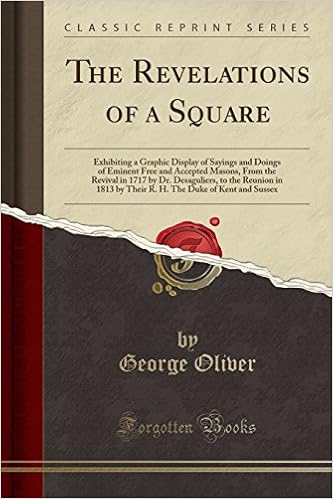
The Revelations of a Square
By: George Oliver
Excerpt from The Revelations of a Square: Exhibiting a Graphic Display of Sayings and Doings of Eminent Free and Accepted Masons, From the Revival in 1717 by Dr. Desaguliers, to the Reunion in 1813 by Their R. H. The Duke of Kent and Sussex
Freemasonry, like all other sciences, is a system of progression. Something more is required to constitute a bright Mason than a knowledge of the elements of the Craft. A carpenter may know the names of his tools, and have acquired some dexterity In their practical use but this will not enable him to build a house, or to construct a common dressing-case.
 The Freemasons Chronicle, a weekly record of masonic intelligence, was first published 2nd January 1875 London, England as an independent weekly journal of masonic interest and continued for 27 years.
The Freemasons Chronicle, a weekly record of masonic intelligence, was first published 2nd January 1875 London, England as an independent weekly journal of masonic interest and continued for 27 years.
It should be the business of a journal devoted to the interests of the Order to attempt the removal of prejudices such as these, which, though they may have little perceptible influence upon the prosperity of the Fraternity, yet have the effect of preventing timid or ill-informed persons from enlisting under its banner.
It will not only attempt to keep pace with the growing literary requirements of the day, but it will seek to exhibit the Order to the non-Masonic world divested of its technical details, and clothed in the garb of Charity and Brotherly Love.
The questions of the hour, which exercise the minds of thoughtful men, will be handled freely and broadly, without any tinge of political or sectarian bias.
The memoranda of Masonic gatherings which will appear from week to week, will be full and accurate; and as free interchange of opinion is one of the best signs of life and vigour in any society, ample scope will be given for Correspondence on topics of interest to the Order.
If we may venture upon a new rendering of words which recent events have made memorable, we will say here, once and for all, that we will be keen men of business, and will spare no effort, consistent with honour, to achieve commercial success; but first, and before all things, we will prove to our brethren and the world that we are FREEMASONS.
Recent Articles: The Freemason's Chronicle
 Operative And Speculative Masonry Explore the fascinating transition from Operative to Speculative Masonry in our latest post. Discover historical insights from Augustus C. L. Arnold and Rev. Wm. P. Strickland, shedding light on Freemasonry's evolution and its enduring principles. Dive into the rich history and significant milestones that shaped modern Freemasonry. - The Freemason's Chronicle - 2 September 1876 |
 Discover the true essence of Freemasonry, an ancient order founded on the profound principles of love for God and man. It's a call to rise above mere appearances, to embody genuine virtue and benevolence, transcending societal pretense. Embrace the transformative power of simplicity, and let the authentic glories of Freemasonry inspire your path. |
 Discover the intriguing story of a man who became a Mason but openly professed his dislike for the institution. Unravel the peculiar circumstances that led him down this path and explore the unexpected consequences that followed. Dive into this thought-provoking account that challenges our notions of loyalty and reveals the complexities of human nature within the Masonic fraternity. |
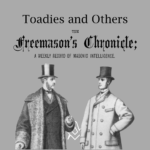 In the realm of Masonry, the principles of equality and respect are paramount. Yet, the presence of toadies—those who obsequiously seek favour from the influential—threatens these ideals. While Masonry embraces diverse beliefs and backgrounds, it rejects the sycophantic behaviours of toadies, flunkeys, and tuft-hunters, urging members to uphold genuine respect and self-worth. The Freemason's Chronicle - 22nd January 1876 |
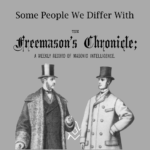 Unveiling the Unpleasant: Some People We Differ With Discover the intriguing dynamics of quarrels within the Masonic brotherhood. From the cantankerous to the litigious, the peevish to the vengeful, delve into the characters that challenge fraternal harmony. Explore their motives, temperaments, and the art of navigating disputes with these fascinating brethren. Brace yourself for a riveting journey into the world of conflicting personalities. |
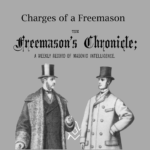 Unravelling the Masonic Mystique: A Deep Dive into the Freemasons' Charges - Explore the intricate world of Freemasonry, its principles, rituals, and the mechanisms for resolving internal disputes. Discover how this ancient fraternity fosters unity, promotes moral conduct, and upholds the sanctity of its secrets, while navigating the complexities of modern society. - The Freemason's Chronicle - 4 December 1875 |
 Unlock the hidden lessons of Masonic Studies! Don't settle for superficial knowledge or mere rituals. Discover the true depth and meaning behind Freemasonry. Expand your understanding of Tracing-Boards, Lectures, and more. Join regular Lodges of Instruction to enhance your Masonic journey. Become a knowledgeable Freemason, not just a token-bearer. Unleash the power of true Masonic wisdom today! |
 Uncover the incredible story of how Masonry saved the life of a Crimean War foot soldier in this historical and masonic account. Through the first hand experience of a soldier engaged in fierce hand-to-hand combat, witness the fateful encounter with a Russian Freemason that changed the course of his life. Learn how brotherhood and a deep dedication to the craft can lead to unforeseen and life-saving circumstances on the battlefield. |
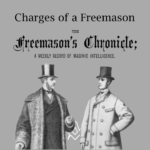 The Freemason's Chronicle - Charges of a Freemason The secrets of Masonry are the exclusive property of the Craft, and can never be communicated to one who is a mere labourer and not an accepted Mason. Hence, no labourer, that is, one who has not been regularly initiated in a legal Lodge. Article first published in The Freemason's Chronicle, 27 November 1875 |
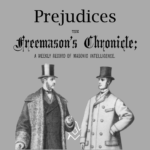 The Freemason's Chronicle - Prejudices Prejudices are partial judgments in favour of, or against certain persons or things, and, for convenience sake, may be ranged in two categories—those which are, comparatively speaking, harmless, and those which are harmful. Article first published in The Freemason's Chronicle, Oct. 2 1875. |
 The Freemason's Chronicle - Cliques Is Freemasonry - a Clique ? Man has been defined as a gregarious animal, but in his highly civilised condition he is gregarious only to a limited extent. First published in The Freemason's Chronicle, Oct. 2 1875, addresses the same challenges then as now. |
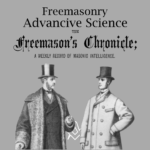 The Freemason's Chronicle - Freemasonry - an Advancive Science Is Freemasonry - an Advancive Science ? Not to confuse advancement with innovation. Has it been the case that Freemasonry's survival for 300 years plus is due to being an Advancive Science, tending to advance. First published in The Freemason's Chronicle 18 September 1875, addresses the same challenges then as now. |
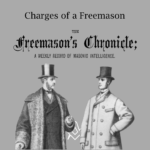 The Freemason's Chronicle - Charges Of A Freemason An interpretation of the "Charges of a Freemason", written Bro. Cornelius Moore and published in 1875, that introduce certain opinions that for some readers, will not sit well in contemporary times. - The Freemason's Chronicle, Sept. 11, 1875 |
 On The Order Of The Temple And Its Doctrine. THE Order of the Temple is divided into two great classes, denominated respectively the Order of the Temple and the Eastern Order. The Eastern Order gave birth to the Order of the Temple, and in the course of time has become an appendage of the latter. It is in ancient Egypt that we find the cradle of the Eastern Order. The Freemason's Chronicle, Sept. 4, 1875 |
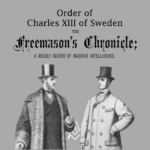 Order of Charles XIII of Sweden The following translation of the Manifesto of King JL Charles XIII of Sweden, on the occasion of his establishing the Masonic Order which bears his name, and of the Statutes of the said Order, may be interesting to our readers. The Freemason's Chronicle, Aug. 28, 1875 |
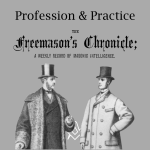 Most of our readers in the course of their experience, have doubtless met with enthusiastic brethren who take it for granted that a Mason can do no wrong. These enthusiasts are thoroughly convinced that the vast majority of those who join the Order are the most benevolent, the most moral, and the very noblest members of society. - The Freemason's Chronicle 10 July 1875 |
 An article investigating the relationship between masonry and citizenship. Are the principles of Freemasonry aligned with the freemason's claim to be a better citizen of the world? The Freemason's Chronicle - 19 June 1875 |
 A visitor must make clear his identity to the satisfaction of the Lodge he proposes to visit. More than once have we been asked to explain our views as to the reception of strangers in a Lodge. - The Freemason's Chronicle - 29 May 1875 |
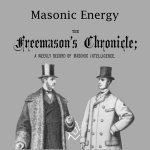 Is there reason in the accusation that Masonic energy looks only to a course of good feeds, when we can point to such grand results as have been achieved in these latter years, both in respect of the extension of our Order ? - 1May 1875 |
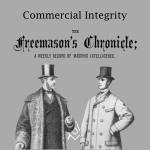 Implementing Freemasonry's peculiar system of morality in our day to day business affairs was the topic of this article, Commercial Integrity, first published in The Freemason's Chronicle - 8 May 1875 |
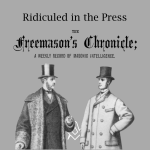 Ridicule has been somewhat illogically described as the test of truth. If it were so, Freemasonry ought to have perished long since. Two press reports from May 1875 covering the |
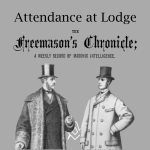 There are many things which Freemasonry will do for a man in the way of opening his mind and giving him larger and kindlier views of life, but Freemasonry itself, cannot eradicate the natural bias of the disposition. |
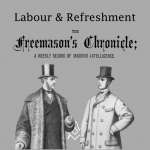 There is, we fear, too marked a tendency in very many Lodges to hasten through its labours, with a view to entering, as soon as possible, upon the business of refreshment. - The Freemason's Chronicle 17th April, 1875 |
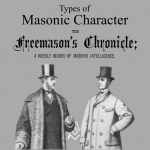 Another example that demonstrates that nothing really changes in Freemasonry. In an article the Types of Masonic Character published 145 years ago in The Freemason's Chronicle 10th April, 1875 |
 A brief history on the relationship between the British Monarchy and the craft - The Freemason's Chronicle 20th March , 1875 |
 What are the qualities of a convivial man and how does this dovetail perfectly in to Freemasonry ? 16th March, 1875 |
 A review of the "Sketch for the History of the Dionysian Artificers," a fragment, by Hyppoli to Joseph Da Costa - This little work may be regarded as, so to speak, the Holy Grail of Masonry. |
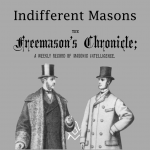 Nothing really changes, an article Indifferent Masons, From Le Monde Maçonnique 1874. Translation published in The Freemason's Chronicle 20th February, 1875 |
 In handling an intruder in the lodge, we endeavoured to show that a good Mason should be a gentleman, and a sincere man. The Freemason's Chronicle 20th February, 1875 |
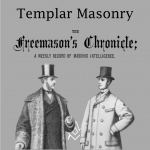 Templar Masonry - a historical aspect of the Religious and Military Order of the Temple published in The Freemason's Chronicle 13th February, 1875 |
 Secrecy perhaps the strongest objection urged by the enemies of the Masonic Order against its existence published in The Freemason's Chronicle 20th March 1875 |
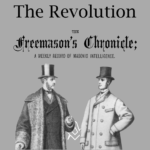 Freemasonry In The United States during And After The Revolution We take a look at Freemasonry in the United States during and after the Revolution first published in The Freemason's Chronicle - February 6, 1875 |
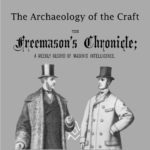 We take a look at the archaeological connection with the Craft, first published in The Freemason's Chronicle - January 30, 1875 |
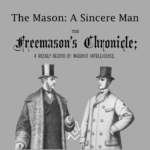 What it means to a Freemason to be a sincere man. Extract: first published in The Freemason's Chronicle - January 23, 1875 |
 What it means to a Freemason to be a citizen of the world ? First published in The Freemason's Chronicle - January 16, 1875 |
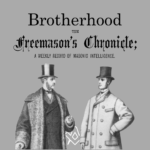 Brotherhood! In that one word what sympathetic associations arise. First published in The Freemason's Chronicle - January 9, 1875 |
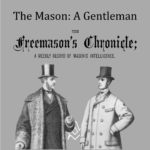 This opening article was written 145 years ago, yet it resonates with Freemasons today as it did then. First published in The Freemason's Chronicle, January 2, 1875, Issue 1 |
masonic knowledge
to be a better citizen of the world
share the square with two brothers

click image to open email app on mobile device



